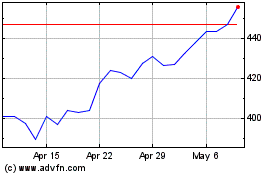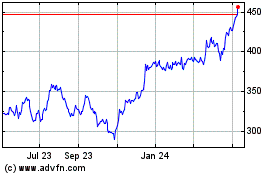By Mike Cherney, Justin Baer and Aaron Kuriloff
Investors are dumping bank stocks amid worries that a protracted
period of slowing global growth, plunging oil prices and
rock-bottom interest rates will combine to inflict pain on the
world's largest financial institutions.
Global markets' anxiety spilled over into Asia early Tuesday,
sending investors scurrying for havens like Japanese government
bonds, where yields fell to zero percent for the first time. Near
the midday break, the Nikkei 225 Stock Average was down almost
5%.
Selling was intense Monday on both sides of the Atlantic, with
bank shares leading the Dow Jones Industrial Average down 1.1%.
U.S. markets staged a late-day bounce that narrowed the Dow
industrials' decline by more than half, but many of the largest
U.S. banks closed lower by at least 4%, including Dow component
Goldman Sachs Group Inc. Morgan Stanley dropped 6.9%, while
Citigroup Inc. fell 5.1%.
The retreat adds to a rout that has shaved tens of billions of
dollars from the value of major U.S. banks' shares this year.
European lenders are also suffering. The Stoxx Europe 600 index
fell 3.5% on Monday, with Germany's Deutsche Bank AG sliding 9.5%.
Adding to the jitters abroad, a small German lender, Maple Bank
GmbH, defaulted on its debt Monday.
Underlying the anxiety is an about-face in many investors'
expectations for global growth. While the U.S. economy continues to
add jobs, suggesting that a recession isn't at hand, economists at
many major financial institutions have reduced their expectations
for Federal Reserve rate increases and U.S. interest rates. The
10-year U.S. Treasury yield on Monday slid to 1.74%, its lowest
level in a year, and European government-bond yields tumbled as
well.
The perception that interest rates will stay lower for longer is
fueling a sharp decline in expectations for banks and related
firms. Rising rates are good for banks because they increase the
spread between what banks charge on loans and what they pay for
deposits and other funding. While the outlook for banks' profits
has been soft for years, the advent last month of negative interest
rates in Japan has jarred many investors, suggesting to them that a
profit recovery for financial firms could be years away.
Adding to investor concerns are the sense that the carnage from
the oil-market rout of the past two years could hit bank balance
sheets and the fear that banks haven't fully disclosed all the
risks they could face in a broad economic downturn.
"Concerns are being amplified dramatically in the current
market," said Peter Stournaras, portfolio manager of the BlackRock
Large Cap Series Funds, who said his firm owns financials. He said
current prices suggest investors expect banks to take losses on
loans that exceed operating earnings, which he deems
unrealistic.
On Monday, shares of Chesapeake Energy Corp. lost a third of
their value amid concerns about the natural-gas firm's finances,
raising concerns about bank exposure to similar firms.
And over the weekend, China reported its latest monthly capital
outflow, a development that many analysts fear could presage a yuan
devaluation that would lead to further market turmoil.
So far, there is little sign that the bank-share rout is
creating headwinds for a U.S. recovery entering its seventh year.
Bank executives have said during a generally solid fourth-quarter
earnings season that they don't expect a U.S. recession and they
believe this year's market selloff is overdone. Few analysts say
they see any signs banks are reducing lending or otherwise
retreating from their position at the center of economic activity.
The bonds issued by U.S. banks continue to perform well, a sign of
the firms' relative robustness and the tighter regulations that
mark a sharp contrast with 2008.
Even so, the selloff has unnerved many investors who fear the
market is telling them something they can't see in the banks'
books, a worry with echoes of the financial meltdown.
"We're six years from the financial crisis, and there's no
confidence that the banks are going to do better," said Brad Hintz,
a former bank-stock analyst and chief financial officer at Lehman
Brothers Holdings Inc. who is now an adjunct professor at New York
University. "Bank stocks have shifted to being trading vehicles"
for betting on a possible recession, he said.
The KBW Nasdaq Bank Index of large U.S. commercial lenders is
down 19% this year. Among the largest U.S. financial firms, Morgan
Stanley is down 29%, Bank of America Corp. and Citigroup are down
27%, Goldman is down 17% and J.P. Morgan Chase & Co. and Wells
Fargo & Co. are each down 14%.
As a result, all but Wells trade at a discount to their stated
per-share net worth, a measure known as book value.
"These are really complicated companies, and the complexities
are part of the risk," said Anat Admati, professor of finance and
economics at Stanford University.
The uncertainty is reflected in a spike in the cost to protect
against missed debt payments using insurancelike contracts called
credit-default swaps. Since the end of October, the costs have
increased more than 60% for some large commercial banks, according
to data from FactSet.
During that time period, the cost to insure Morgan Stanley bonds
for five years has increased 66%, to $141,000 in annual payments
per $10 million of debt, according to FactSet. In 2011, amid the
Greek debt crisis that roiled financial markets, the cost reached
about $490,000, according to FactSet.
Bank bonds with subordinate status, which get repaid after
higher-ranking senior debt, have lagged behind the market.
But senior bank bonds have continued to perform well, suggesting
many investors still think banks are well positioned even if
profits fall somewhat.
The $7 billion Baird Aggregate Bond Fund was 21% invested in
bonds from banks and other finance companies as of Sept. 30, higher
than the roughly 7% finance allocation in its benchmark index.
"We understand why stock prices may fall... if it means their
earnings are not going to grow as quickly," said Warren Pierson, a
senior portfolio manager who helps oversee the fund. But "are we
going to get paid on these bonds? Yes."
Write to Dan Strumpf at daniel.strumpf@wsj.com
(END) Dow Jones Newswires
February 08, 2016 22:29 ET (03:29 GMT)
Copyright (c) 2016 Dow Jones & Company, Inc.
Goldman Sachs (NYSE:GS)
Historical Stock Chart
From Mar 2024 to Apr 2024

Goldman Sachs (NYSE:GS)
Historical Stock Chart
From Apr 2023 to Apr 2024
